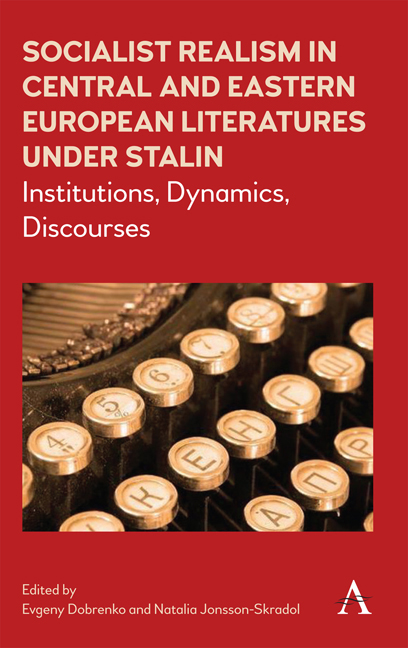 Socialist Realism in Central and Eastern European Literatures under Stalin
Socialist Realism in Central and Eastern European Literatures under Stalin Book contents
- Frontmatter
- Contents
- Acknowledgements
- Introduction
- Part 1 Institutions
- Part 2 Dynamics
- 8 Socialist Writers and Intellectuals in a Divided Nation: The Early GDR Experience
- 9 Stalinism's Imperial Figure: Hero or Clerk of the Pax Sovietica?
- 10 From Avant-Garde to Socialist Realism: Continuities and Discontinuities in Hungarian and Romanian Literature
- 11 The Short Life of Socialist Realism in Croatian Literature, 1945–55
- 12 Literature in Socialist Yugoslavia: Constructing Collective Memory, Institutionalizing the Cultural Field
- 13 ‘Yesterday and Tomorrow’: The Forms of the Slovak Literature of Socialist Realism, 1945–56
- 14 Socialist or Realist: The Poetics of Politics in Sovietized Hungary
- Part 3 Discourses
- Conclusion
- List of Contributors
- Index
9 - Stalinism's Imperial Figure: Hero or Clerk of the Pax Sovietica?
from Part 2 - Dynamics
Published online by Cambridge University Press: 10 May 2018
- Frontmatter
- Contents
- Acknowledgements
- Introduction
- Part 1 Institutions
- Part 2 Dynamics
- 8 Socialist Writers and Intellectuals in a Divided Nation: The Early GDR Experience
- 9 Stalinism's Imperial Figure: Hero or Clerk of the Pax Sovietica?
- 10 From Avant-Garde to Socialist Realism: Continuities and Discontinuities in Hungarian and Romanian Literature
- 11 The Short Life of Socialist Realism in Croatian Literature, 1945–55
- 12 Literature in Socialist Yugoslavia: Constructing Collective Memory, Institutionalizing the Cultural Field
- 13 ‘Yesterday and Tomorrow’: The Forms of the Slovak Literature of Socialist Realism, 1945–56
- 14 Socialist or Realist: The Poetics of Politics in Sovietized Hungary
- Part 3 Discourses
- Conclusion
- List of Contributors
- Index
Summary
Pax Romana
The Ara Pacis Augustae, the great altar consecrated to the Augustan Pax Romana, bears a fresco of the goddess Pax with Plutos, the child god of wealth, nursing on her arm, the fruit of plenty on her lap, a sheep and cow grazing at her feet and sprays of wheat and poppies behind her. Her sisters, Justice and Good Order, sit mounted on animals to either side of her. Originally, the Latin pax did not signify peace, as personified by the Greek Eirene, but a pact or treaty without any special cultic standing. After defeating Antony at Actium in 31 BC, Augustus instituted an imperial Burgfrieden (political truce) among the contending social parties, invoking Caesar's iconography of Concordia. When the provinces of Gaul and Spain were pacified in 13 BC, Augustus signalled that the revival of the Greek cult of Eirene would displace Bellum from the cosmic heart of Roman sovereignty. The Senate commissioned the Ara Pacis with a frieze depicting Pax as kourotrophos – a nursing mother. Dedicated in 9 BC on the Campus Martius (the Field of War), the altar consecrated the empire to the idea that the prosperity of peacetime served the empire better than the uncertain plunder of riches through wars of conquest.
The Augustan cult of Pax became a myth of imperial peace that lasted two millennia through the world wars of the twentieth century. While popular struggles for democracy grew throughout the European nineteenth century, the idea of imperial peace endured in the European political imagination until at least the end of World War II. In his 1913 Romanes Lecture at Oxford, The Imperial Peace, William Ramsay proclaimed: ‘In modern times […] the rivalries of the various nations and states are the cause of war. That some higher power, able to enforce compliance with its decisions, and able to give just and fair decisions in every case, should exist, is the condition on which the peace of Europe has always seemed to depend’. As for the importance of the peace that justifies empire, Ramsay quotes Dante, inspired in turn by Virgil: ‘Of all things that are ordered to secure blessings to men, peace is the best.’
- Type
- Chapter
- Information
- Socialist Realism in Central and Eastern European Literatures under StalinInstitutions, Dynamics, Discourses, pp. 129 - 146Publisher: Anthem PressPrint publication year: 2018


